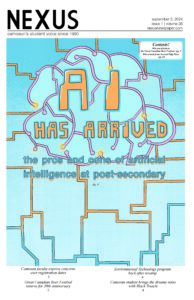This summer, I attended the Otherworld Burning Man event, four days of non-stop electronic music with bass lines so deep you can feel the vibrations in your bones. Psychedelic drugs are everywhere.
Burning Man events are about escaping the cagey terror of living in a paranoid culture where we’re afraid of our neighbours, whose names we don’t even know. There is something to be said for forming a community of people who share the same values and who openly accept each other.
A major spectacle at Otherworld is the Naked Run, where anyone can take off all their clothes and run around together without shame. It seemed like everyone was having a wonderful time, connecting with each other on a deeply human level. But I felt like I didn’t exist. I was struck by a visceral feeling of grief.
I’ve never felt like I belonged anywhere. At Burning Man, I’m surrounded by the most bizarre group of eclectic weirdos our society has to offer. Here, of all places, I should fit in. But I was invisible. One singular thought burned into my mind: I’m nearly 40 years old and I can’t even fit in with a bunch of freaks. So what’s the point of faking it for 40 more years?

I couldn’t do it anymore. I knew with an overwhelming conviction that I just needed to die. I would leave in the morning and drive off the side of the Malahat. Surrounded by hundreds of happy people who blissfully ignored me, I lay curled up, weeping until I couldn’t breathe.
The next morning, I began to pack up. As I was about to leave, a friend intercepted me and took me aside. I had another cry and he eventually convinced me to hold off killing myself until tomorrow. “For now, let’s just cook some breakfast.” This seemed like a passable idea.
Later that night, despite being emotionally and physically exhausted, I went to another event, the Temple Burn, where a wooden temple is constructed and people are invited to write thoughts and feelings they want to leave behind. Later, that wood would be burned. I saw a lot of pain on those walls.
A young woman struck up a conversation with me, gave me a line of ketamine, and asked if I wanted to hang out with her friends that evening. Sure, why not? We swam through thick throngs of people, flashing neon lights, laser smoke displays, and the rolling thunder of bass drops.
I told one of my companions about how everyone was having such a great time, but I wasn’t even human. He confided to me that he had scream-cried three times that week. He’s racked with chronic pain. He knew someone who had killed themselves, and someone who was planning on it.
“Everybody suffers,” he told me. “It’s the only thing we truly have in common.”
I had been looking at it all wrong. I was searching for joy as a benchmark of human connection, but that’s not it at all. It’s pain that binds us together.
But what about romance and friendship? Isn’t that about joy? Sure. But anyone who’s in a committed relationship knows that the real strength isn’t in the good times; it’s in the ability to support each other through the tougher days, through the blood and vomit, and come out the other end stronger together. That’s love that lasts.
I do belong. Like everyone else, I have hidden pain. So, the next time you feel like an alien, don’t focus on all the fun that everyone else is having. Human connection is about recognizing our common suffering… and there’s incredible beauty in that.
